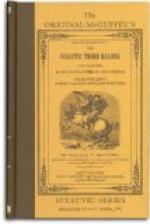10. “I have no objection, my dear, if the weather is fine. And now, as we walk home, tell me what you have learned from your morning’s sport.” “I have learned to fly my kite properly.” “You may thank aunt for it, brother,” said Lucy, “for you would have given it up long ago, if she had not persuaded you to try again.”
11. “Yes, dear children, I wish to teach you the value of perseverance, even when nothing more depends upon it than the flying of a kite. Whenever you fail in your attempts to do any good thing, let your motto be,—try again.”
Definitions.—In defining words, that meaning is given which is appropriate to them in the connection in which they are used.
4. En-tan’gled, twisted in, disordered. 5. As-sist’-ance, help, aid. Dis-en-gaged, cleared, set free. 6. Grass’plot, a space covered with grass. Dig’ni-ty, majestic manner. 7. Dis-ap-point/ments, failures or defeats of expectation. Dis-cour’age, take away courage. 9. Glee, joy 11. Per-se-ver’ance, continuance in anything once begun. Mot’to, a short sentence or a word full of meaning.
Exercises—What is the subject of this lesson? Why was John discouraged in his attempts to fly his kite? What did his, aunt say to him? What may we learn from this? What should be our motto if we expect to be successful?
II. TRY, TRY AGAIN. (28)
1. ’T is a lesson you should heed,
Try, try again;
If at first you don’t succeed,
Try, try again;
Then your courage should appear,
For, if you will persevere,
You will conquer, never fear;
Try, try again.
2. Once or twice though you should fail,
Try, try again;
If you would at last prevail,
Try, try again;
If we strive, ’tis no disgrace
Though we do not win the race;
What should you do in the case?
Try, try again.
3. If you find your task is hard,
Try, try again;
Time will bring you your reward,
Try, try again.
All that other folks can do,
Why, with patience, should not you?
Only keep this rule in view:
Try, try again.
Definitions.—l. Cour’age, resolution. Con’quer, gain the vic-tory. 2. Pre-vail, overcome. Dis-grace’, shame. Win, gain, ob-tain. 3. Re-ward’, anything given in return for good or bad con-duct. Pa’-tience, constany in labor.
Exercises.—What does the mark before “’T is” mean? What is it called? What point is used after the word “case” in the second stanza? Why?
III. WHY THE SEA IS SALT. (29) A FAIRY TALE.
Mary Howitt was born in 1804, at Coleford, England. She wrote many charming stories for children in prose and verse, and also translated many from Swedish, Danish, and German authors. This story is arranged from one in a collection named “Peter Drake’s Dream, and Other Stories.” She died in 1888.




